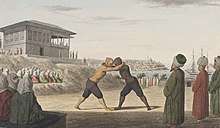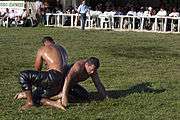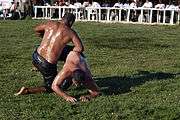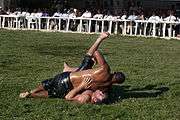Oil wrestling
Oil wrestling (Turkish: Yağlı güreş), also called grease wrestling,[1] is the Turkish national sport. It is so called because the wrestlers douse themselves with olive oil. The term "Güreş" is shared with other forms of wrestling practiced by Turkic speakers across Europe and Central Asia, such as the Uzbek kurash, Tuvan khuresh and Tatar köräş. The wrestlers, known as pehlivan (meaning "hero" or "champion"), wear a type of hand-stitched leather trousers called a kisbet (sometimes kispet), which is traditionally made of water buffalo hide, and most recently has been made of calfskin.
| Kırkpınar oil wrestling festival | |
|---|---|
Oil wrestling tournament in Istanbul | |
| Country | Turkey |
| Reference | 386 |
| Inscription history | |
| Inscription | 2010 (5th session) |
Unlike Olympic wrestling, oil wrestling matches may be won by achieving an effective hold of the kisbet. Thus, the pehlivan aims to control his opponent by putting his arm through the latter's kisbet. To win by this move is called paça kazık. Originally, matches had no set duration and could go on for one or two days until one man was able to establish his superiority, but in 1975 the duration was capped at 40 minutes for the baspehlivan and 30 minutes for the pehlivan category. If there is no winner, play continues for another 15 minutes—10 minutes for the pehlivan category, wherein scores are kept to determine the victor.
The annual Kırkpınar tournament, held in Edirne in Turkish Thrace since 1346, is the oldest continuously running, sanctioned sporting competition in the world. Oil wrestling festivals also take place in the Turkish-inhabited regions of Bulgaria[2] (Ludogorie and Rhodopes), as well as northern Greece in the Eastern Macedonia (Serres region) and West Thrace (Rhodope Mountains).[3][4][5][6] In recent years, this style of wrestling has also become popular in other countries, particularly the Netherlands and Japan.
History
Cognate forms of folk wrestling practiced by Turkic-speakers are found throughout Western Eurasia (i.e. Europe and Central Asia) under the names Köraş, Khuresh, Kurash, etc.

Oil wrestling can be traced back to the ancient Sumer and Babylon.[7] Greco-Roman traditions also point to the practice of oil wrestling.[8]
Turkish wrestlers started covering themselves according to Islamic law (between the navel and the knees) after the 10th century. The Turkish word for wrestling can be traced back to the old Oghuz Turkic languages, which originate from the Eurasian steppes, where wrestling has also been practiced. After the conquest of Anatolia by Seljuk Turks, a form of traditional freestyle wrestling called Karakucak Güreşi (literally "Ground hug") was popularized, where special leather clothing was sanctioned and wrestlers commenced the activity by pouring olive oil on their bodies in order to make it harder for the wrestler grip one's opponent. This form continued to what is today known as Yağlı Güreş or Turkish oil wrestling. In the Ottoman Empire, wrestlers learned the art in special schools called tekke (تکیه), which were not merely athletic centres, but also spiritual centres.



Wrestlers oil one another prior to matches as a demonstration of balance and mutual respect. If a man defeats an older opponent, he kisses the latter's hand (a sign of respect for elders in Turkey).
Matches are held all over Turkey throughout the year, but in early summer, around 1000 competitors gather in Kırkpınar for an annual three-day wrestling tournament to determine who will be the winner or baspehlivan ("chief wrestler") of Turkey. Ottoman chroniclers and writers attest that the Kırkpınar Games have been held every year since 1362, making them the world's oldest continually sanctioned sporting competition. The games have been cancelled only about 70 times. The original site was some 35 kilometres (22 mi) distant. In 1924, they were moved to the present location after the Balkan War.
There are some organized oil wrestling competitions outside Turkey, particularly by the Royal Dutch Power Sport Federation (KNKF Koninklijke Nederlandse Krachtsport en Fitnessfederatie) in the Netherlands.
Notable pehlivans
It is notable that all of the pehlivans listed above were born into Turkish families in Bulgaria, which was then part of the Ottoman Empire.
Notable aghas
- Süleyman Şahin (1967–68)
- Gazanfer Bilge (1969–70)
- Alper Yazoğlu (1991–93) •
- Hüseyin Şahin (1995–98) •
- Seyfettin Selim (2009–13) •
• These aghas were awarded a golden belt.[9]
See also
References
- Turkish Review Quarterly Digest - Volume 6, Issue 28 - Page 62
- Doychinov, Nikolay. "Bulgarian oil wrestlers, known as pehlivans..." Vancouver Sun.
- 28-Ιουλ-2005 Άρθρο στην Εφημερίδα ο Χρόνος Archived 2011-11-05 at the Wayback Machine: Στα «Χίλια» Δερίου το πρώτο επίσημο πρωτάθλημα πάλης με λάδι.
- 7-Αυγ-2007 Άρθρο στην εφημερίδα Ο Χρόνος Archived 2011-11-05 at the Wayback Machine: Υποτονική η προσέλευση του κόσμου στα 'Χίλια' - Πανηγύρι πάλης και ελεύθερης διακίνησης ιδεών".
- "Λαϊκός Πολιτισμός Νομού Σερρών". Ιστοσελίδα Νομαρχιακής Αυτοδιοίκησης Σερρών. Archived from the original on 2011-08-26. Retrieved 2011-09-12.
- "09.09.2011: Πάλη με λάδι στο οροπέδιο του Αλάν Τεπέ". Archived from the original on 2016-09-20. Retrieved 2011-09-12.
- Kirkpinar - All about Turkish Oilwrestling, Page 75
- Kirkpinar - All about Turkish Oilwrestling, Page 88
- (in Turkish).